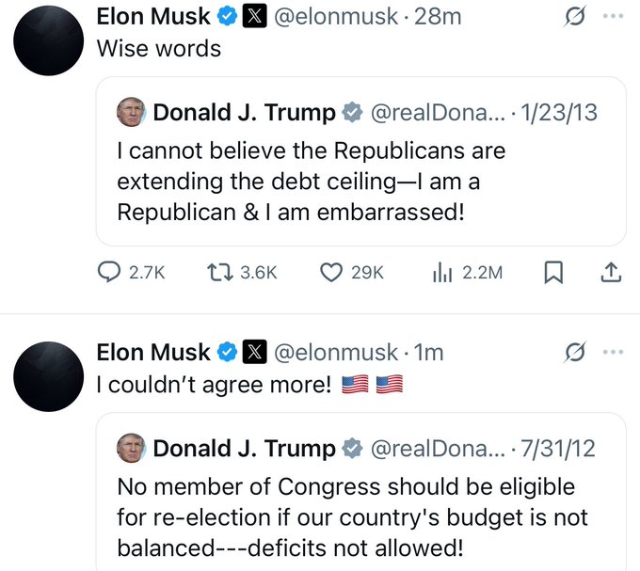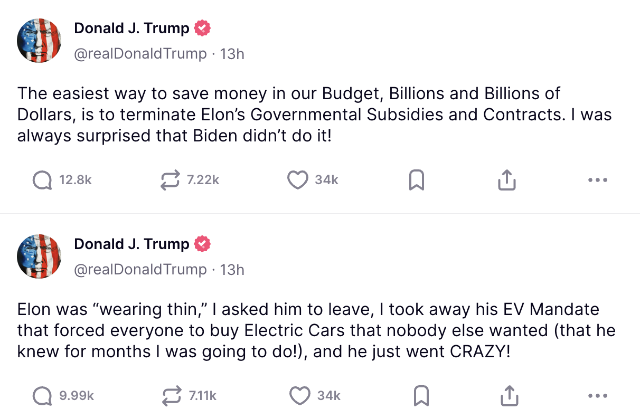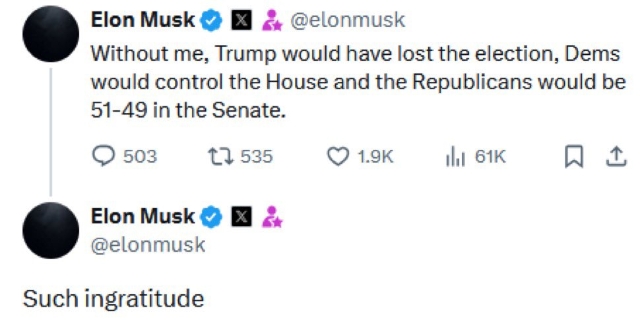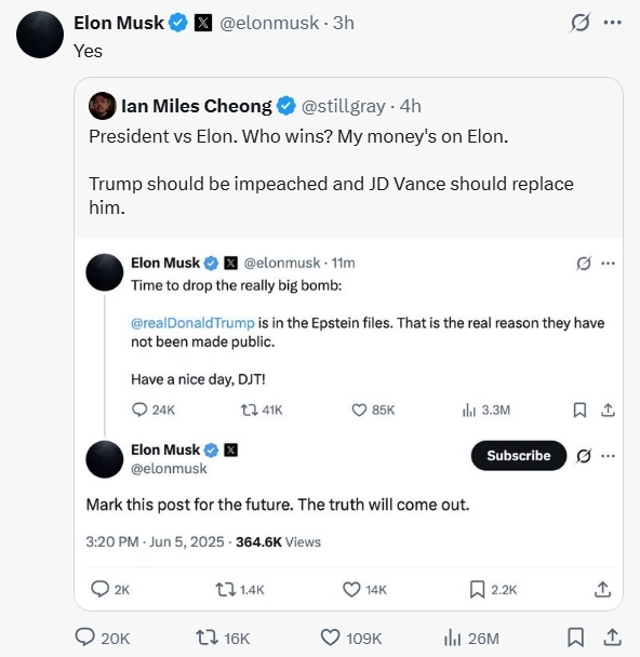
Elon Musk reacts as Donald Trump speaks at a rally ahead of the 60th Presidential Inauguration on Jan. 19, 2025, in Washington. (Photo: CFP)
A dramatic political and corporate fallout has erupted between U.S. President Donald Trump and tech billionaire Elon Musk, as a simmering disagreement over tax legislation burst into full public view on June 5, local time.
The rift became unmistakably personal when Musk and Trump exchanged a series of pointed barbs on their respective social media platforms, marking a stunning breakdown in what was once considered one of Washington's most unusual but mutually beneficial partnerships.
The market has not taken the dispute lightly. Tesla shares dropped by about 14.2% on June 5, wiping roughly $152 billion off the value of the company.
Breakdown of an unlikely alliance
The feud was triggered by Musk's posts criticizing Trump's signature economic legislation, known as the One Big Beautiful Bill, which he said would deepen the U.S. budget deficit and burden Americans with "crushing" debt.
In a scathing series of reposts on X, Musk highlighted old Trump tweets warning against rising debt and calling for accountability in government spending, sarcastically agreeing with Trump's past sentiments.

"Elon is upset because we took the EV mandate," Trump said on June 5, responding to questions about Musk's sharp criticism while German Chancellor Friedrich Merz sat beside him in uncomfortable silence in the Oval Office.
The bill would eliminate incentives of up to $7,500 for new electric vehicle purchases and $4,000 for used ones, while also ending tax breaks for installing EV charging stations at homes and businesses.
"He knew everything about it. He had no problem with it," Trump added. "I'm very disappointed in Elon. I've helped him a lot."
The president took to his Truth Social platform to threaten the cancellation of federal contracts with Musk's companies, including SpaceX, saying the easiest way to save billions would be to "terminate Elon's Governmental Subsidies and Contracts."
The threat carries serious weight: NASA currently relies heavily on SpaceX's Dragon spacecraft for transporting crew and cargo to the International Space Station.

Musk fired back swiftly, saying "SpaceX will begin decommissioning its Dragon spacecraft immediately", and warned that without his support, Trump would not have won re-election.

He also launched a poll asking followers whether it was time to form a new political party representing "the 80% in the middle".
In a particularly explosive claim, Musk suggested Trump may be implicated in unreleased documents linked to the late sex offender Jeffrey Epstein and called for Trump's impeachment.

White House Press Secretary Karoline Leavitt offered only a muted response to Musk's accusations.
"This is an unfortunate episode from Elon, who is unhappy with the One Big Beautiful Bill because it does not include the policies he wanted," she said.
A rift long in the making
Behind the scenes, tensions had been simmering for some time, with Musk and Tesla increasingly vocal about their concerns over the tax bill's elimination of EV incentives.
"Abruptly ending the energy tax credits would threaten America's energy independence and the reliability of our grid," Tesla's solar power unit warned in a post on X in late May.
"There is no change to tax incentives for oil & gas, just EV/solar," Musk added in a follow-up post.
The pushback comes as Tesla faces worsening financial pressure. With sales plunging in 2025, the company needs the credits to maintain buyer demand.
In a note to clients on June 5, JPMorgan estimated that the loss of EV tax credits could cost Tesla around $1.2 billion annually.
The situation further deteriorated in early June, just days after Musk's official departure from the White House, when the administration abruptly withdrew the nomination of Jared Isaacman, a billionaire private astronaut and Musk's favored choice, to lead NASA.
Musk was reportedly dismayed by the decision, according to a person familiar with his reaction.
"It is rare to find someone so competent and good-hearted," Musk posted on X, responding to the news of Isaacman's removal.
Washington braces for impact
Trump and Musk's falling out is all the more striking given the high-profile nature of their previous collaboration. Musk served briefly as head of the newly created Department of Government Efficiency (DOGE), where he oversaw agency cuts and aggressive cost-saving measures. Though controversial, the appointment was a symbolic nod to the administration's willingness to embrace unconventional allies.
Their relationship had once seemed unshakable, surviving months of political turbulence and conflicting egos.
But those days are over.
"Elon and I had a great relationship," Trump said on June 5—his use of the past tense underscoring the finality of the break.
Now, as the two men publicly trade threats and insults, the political consequences are rippling through Washington. Republican lawmakers backing Trump's legislation may now face pressure from Musk-aligned voters and donors, while Democrats remain cautiously amused at the infighting.
"It's a zero-sum game," said Democratic strategist Liam Kerr. "Anything that he does that moves more toward Democrats hurts Republicans."
Whether the feud burns out or escalates further remains to be seen.
"Trump has 3.5 years left as president, but I'll be around for 40+ years," Musk wrote on X.
Reporter | Liu Xiaodi
Editor | Yuan Zixiang, James, Shen He

















